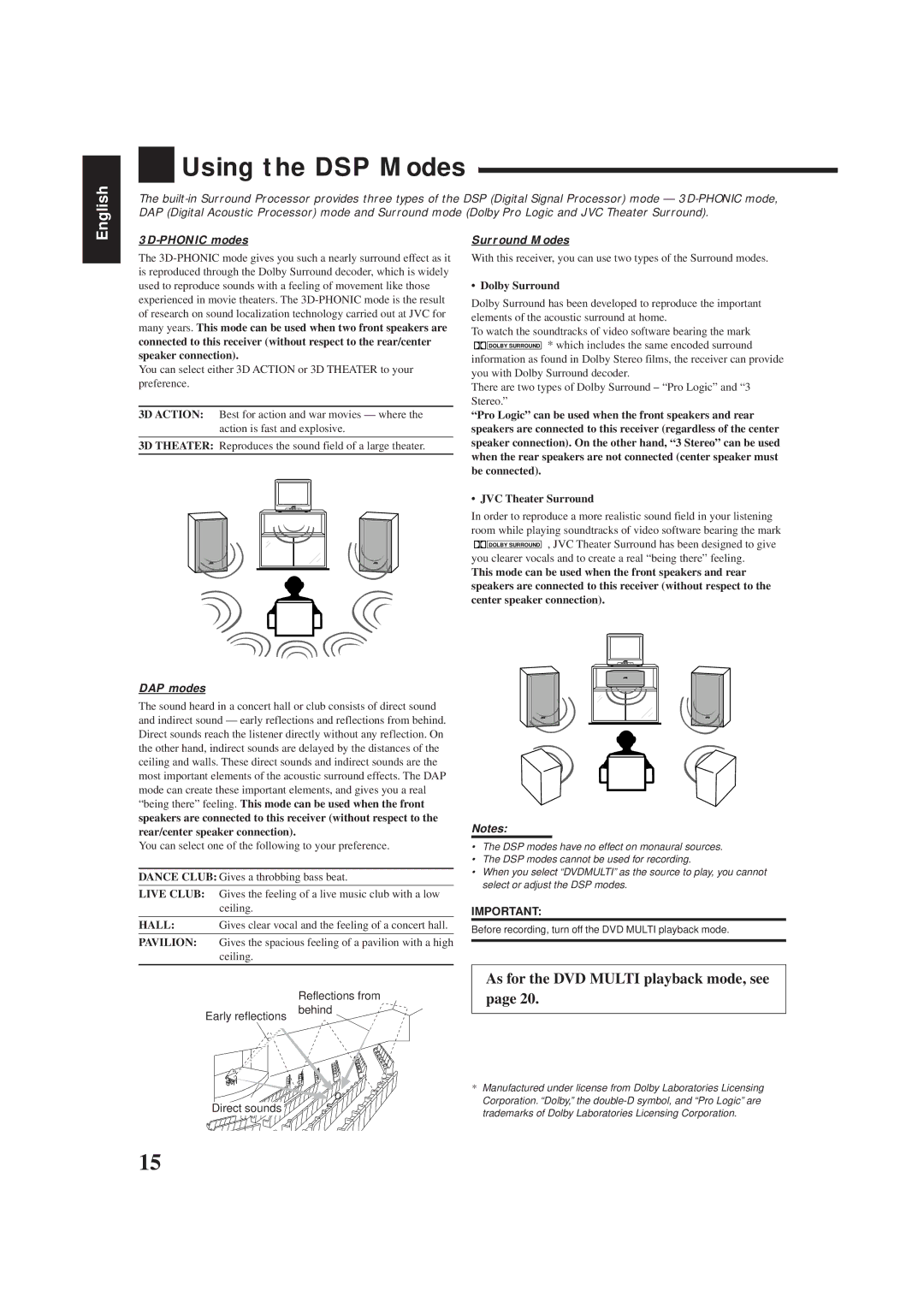
English

 Using the DSP Modes
Using the DSP Modes
The
3D-PHONIC modes
The
connected to this receiver (without respect to the rear/center speaker connection).
You can select either 3D ACTION or 3D THEATER to your preference.
3D ACTION: Best for action and war movies — where the action is fast and explosive.
3D THEATER: Reproduces the sound field of a large theater.
Surround Modes
With this receiver, you can use two types of the Surround modes.
• Dolby Surround
Dolby Surround has been developed to reproduce the important elements of the acoustic surround at home.
To watch the soundtracks of video software bearing the mark
![]()
![]()
![]()
![]()
![]()
![]()
![]() DOLBY SURROUND * which includes the same encoded surround information as found in Dolby Stereo films, the receiver can provide you with Dolby Surround decoder.
DOLBY SURROUND * which includes the same encoded surround information as found in Dolby Stereo films, the receiver can provide you with Dolby Surround decoder.
There are two types of Dolby Surround – “Pro Logic” and “3 Stereo.”
“Pro Logic” can be used when the front speakers and rear speakers are connected to this receiver (regardless of the center speaker connection). On the other hand, “3 Stereo” can be used when the rear speakers are not connected (center speaker must be connected).
• JVC Theater Surround
In order to reproduce a more realistic sound field in your listening room while playing soundtracks of video software bearing the mark ![]()
![]()
![]()
![]()
![]()
![]()
![]() DOLBY SURROUND , JVC Theater Surround has been designed to give you clearer vocals and to create a real “being there” feeling.
DOLBY SURROUND , JVC Theater Surround has been designed to give you clearer vocals and to create a real “being there” feeling.
This mode can be used when the front speakers and rear speakers are connected to this receiver (without respect to the center speaker connection).
DAP modes
The sound heard in a concert hall or club consists of direct sound and indirect sound — early reflections and reflections from behind. Direct sounds reach the listener directly without any reflection. On the other hand, indirect sounds are delayed by the distances of the ceiling and walls. These direct sounds and indirect sounds are the most important elements of the acoustic surround effects. The DAP mode can create these important elements, and gives you a real “being there” feeling. This mode can be used when the front
speakers are connected to this receiver (without respect to the rear/center speaker connection).
You can select one of the following to your preference.
DANCE CLUB: Gives a throbbing bass beat.
LIVE CLUB: Gives the feeling of a live music club with a low ceiling.
HALL: Gives clear vocal and the feeling of a concert hall.
PAVILION: Gives the spacious feeling of a pavilion with a high ceiling.
Notes:
•The DSP modes have no effect on monaural sources.
•The DSP modes cannot be used for recording.
•When you select “DVDMULTI” as the source to play, you cannot select or adjust the DSP modes.
IMPORTANT:
Before recording, turn off the DVD MULTI playback mode.
Early reflections
Direct sounds
Reflections from behind
As for the DVD MULTI playback mode, see page 20.
*Manufactured under license from Dolby Laboratories Licensing Corporation. “Dolby,” the
15
